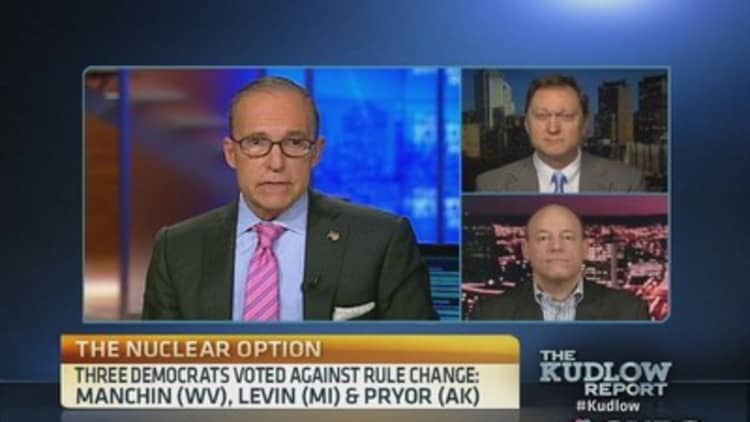Washington went "nuclear" this week and the big question is what kind of fallout will hit markets and the economy.
Republicans and some Wall Street analysts warn that Senate Majority Leader Harry Reid's decision to blow up the filibuster on presidential nominations will lead to an even darker period of partisan acrimony, throwing into question the ability of Congress to pass a bill to fund the government past January and raise the debt limit in February.
"You will no doubt come to regret this, and you may regret it a lot sooner than you think," Senate Minority Leader Mitch McConnell, R-Ky., said Thursday, sounding like a sinister movie villain.
Some political analysts including Guggenheim's Jaret Seiberg and Qorvis' Stan Collender said they thought the so-called nuclear option raised the (still fairly low) possibility of shutdown and default.
But Democrats mostly laugh off these warnings. And they are probably right to do so. Democrats do not believe Republicans will do something clearly against their own political interest—the last shutdown crushed the party's approval ratings—just out of spite over Reid's move.
(Read more: Obamacare dividing Republican governors)
It's not that Democrats believe the GOP never acts out of spite. But they think political expedience generally trumps personal pique.
"They are going to get mad at us just because we fought back?" former Democratic Rep. Barney Frank asked me at breakfast event in New York on Friday. He added that he did not think the GOP would be any more likely to force a shutdown or debt limit crisis. "They will do what's in their political self-interest."
The White House, which pushed for Reid to invoke the nuclear option, also clearly does not think it increases the risk of another fiscal crisis that could once again slow an economy that seems poised for a solid 2014.
"I do think that Republicans have found that trying to shut down the government or threatening the full faith and credit of the United States of America over Obamacare was something that the American public had very little patience for," deputy press secretary Joshua Earnest told me at the White House press briefing on Thursday.
While in the building, your DCMNI columnist also spoke with senior White House advisor Valerie Jarrett, the administration's main liaison to Wall Street and the business community, and she had the same message.

"They saw the negative impact that had on the economy the last time," Jarrett said, dismissing the idea that a fresh crisis was now more likely.
(Read more: Limbo on federal jobless benefits makes Congress the Grinch)
Meanwhile, Reid's move could have some ramifications that would be positive for markets and the economy. President Barack Obama will now have an easier time getting swift confirmation for Janet Yellen as chair of the Federal Reserve and for two other open spots on the central bank board.
Filling slots on the D.C. circuit court also means a swifter path to regulations being finalized after legal challenges. Obama can now also install a new head of the CFTC faster. If you subscribe to the nonpartisan view that what business and the markets hate most is uncertainty, then the end of the nomination filibuster would be a positive development.
The move is likely to be less popular with many in the banking industry because it means that Obama will now be able to win confirmation for Rep. Mel Watt, D-N.C., as director of the FHFA. Banks have opposed Watt because they view him as likely to push for more mortgage loan principal forgiveness. And indeed he probably will. But while that may be bad for some banks' bottom lines it could aid homeowner balance sheets, leading to more consumption in the economy.
(Read more: Why Tim Geithner's critics have it all wrong)
So the near term fears of the impact of Reid's decision to go nuclear are likely overblown. But the long-term implications could be more serious. Many in Washington now assume that as soon as Republicans get control of the Senate they will get rid of the filibuster on legislation, possibly easing the way to repeal of Obamacare and maybe even the Dodd-Frank financial reform law.
That kind of massive legislative backtracking, which has been largely absent in the filibuster age, could create massive uncertainty for entire industries and create the kind of nonproductive regulatory compliance work that stifles faster growth.
The bottom line is you may not have to worry about the nuclear fallout now, but look out down the road.
(Read more: Fed's Lockhart: No taper until we're ready)
— By Ben White. White is POLITICO's chief economic correspondent and a CNBC contributor. He also authors the daily tip sheet POLITICO Morning Money [politico.com/morningmoney] Follow him onTwitter @morningmoneyben.


